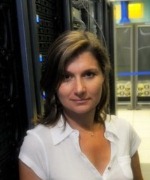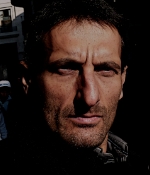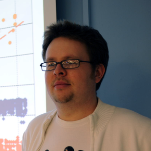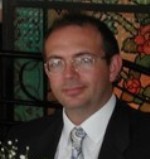|
|
iCSC 20013
Mentors Biographies
at the
time of the school
|
|
François Flückiger |
CERN |
 |
|
François Flückiger, Director of the
CERN School of Computing, is Knowledge and Technology Transfer Officer
for Information Technologies at CERN . Before joining CERN in 1978, he
was employed for five years by SESA in Paris. At CERN, he has been in
charge of external networking for more than 12 years and held positions
in infrastructure and application networking, including the management
of CERN's World-Wide Web team after the departure of the Web inventor
Tim Berners-Lee. He is an adviser to the European Commission, a member
of the Internet Society Advisory Council and the author of the reference
textbook "Understanding Networked Multimedia" as well as more than 80
articles. He has 40 years
of experience in networking and information technologies. François Flückiger graduated from the Ecole Supérieure d'Electricité in 1973 and
holds an MBA from the Enterprise Administration Institute in Paris in
1977. |
|
|
|
|
Maria Girone |
CERN |
 |
|
Maria Girone graduated in Physics
at the University of Bari (Italy). She earned her Ph.D. in High Energy
Physics in 1994. Maria was awarded a CERN research fellowship in the
ALEPH experiment and later worked at Imperial College, London as a
research associate. In 2001 Maria joined the LHCb collaboration, where
she contributed to the development of photon detectors for the RICH
system.
Maria moved to the WLCG project in 2002 as a developer of the
Persistency Framework, elements of which are still in use at the LHC.
From 2004 to 2009 she was section leader and service manager of the
Oracle database services for the LHC experiments, essential for the data
acquisition, production and analysis of the data produced at the LHC
accelerator.
In 2009, she was appointed deputy group leader of the
CERN IT Experiment Support group and task leader of the EU project EGI-InSPIRE
work package Services for HEP. She has supported the 4 LHC experiments
during the challenging years of the first run. Her main focus has been
on the delivery of common solutions across the LHC experiments in data
management, analysis and monitoring in order to achieve a more
sustainable operations and development model.
Since summer 2012
Maria leads the WLCG Operations Coordination team, responsible for the
core operations and commissioning of new services in WLCG. It entails
coordination between sites, the LHC experiments, service and
infrastructure providers: a team of several dozens people located
world-wide.
|
|
|
|
|
Vincenzo Innocente |
CERN |
 |
|
Vincenzo Innocente has been
responsible of simulation and reconstruction software for three
generations of collider experiments at CERN.
In the CMS
experiment at LHC he has been Chief Software Architect till year 2006
and later leader of the ``Performance Task Force''.
Since 2008 he
is involved in R&D projects in the CERN Physics Department to adapt HEP
software to run efficiently on new multicore computing platforms.
|
|
|
|
| Sebastian
Lopienski |
CERN |
|
 |
Sebastian Lopienski is CERNs deputy Computer Security Officer. He works on
security strategy and policies; offers internal consultancy and audit
services; develops and maintains security tools for vulnerability assessment
and intrusion detection; provides training and awareness raising; and does
incident investigation and response. During his work at CERN since 2001,
Sebastian has had various assignments, including designing and developing
software to manage and support services hosted in the CERN Computer Centre;
providing Central CVS Service for software projects at CERN; and development
of applications for accelerator controls in Java. He graduated from the
University of Warsaw (MSc in Computer Science) in 2002, and earned an MBA
degree at the Enterprise Administration Institute in Aix-en-Provence in
2010. His professional interests include software and network security,
distributed systems, and
Web and mobile technologies.
|
|
|
|
|
Andrzej Nowak |
CERN |
|
 |
Andrzej Nowak is a member of the CERN openlab CTO office,
leading the openlab collaboration with Intel in the Platform Competence
Center (PCC). While the PCC focuses mainly on efficient computing solutions
for the Large Hadron Collider, the openlab is a broader research partnership
between CERN and HP, Huawei, Intel, Oracle and Siemens, with the aim of
evaluating and advancing cutting edge IT in a demanding environment. Andrzej
has been with openlab since January 2007, when he joined as a Marie Curie
Fellow sponsored by the European Commission. Since then, his research
concerned high throughput computing, modern parallelism challenges, and
recently problems from the Big Data domain. Andrzej also pioneered the
educational activities of the openlab: he co-founded multiple teaching
series that, over the course of six years, have trained over a thousand
scientists and engineers in dozens of workshops, tutorials and international
computing schools.
|
|
|
|
|
Alberto Pace |
CERN |
|
 |
Alberto Pace is a member if the IT department at CERN where he
leads the Data Management group ensuring a coherent development process for
Physics Data management activities, strongly driven by operational and user
needs. He has more than 20 years experience in computing services,
infrastructure, software engineering, accelerator control and accelerator
operation. He graduated in Electronic Engineering from Politecnico di Milano
(Italy) in 1987.
|
|
|
|
|
|
